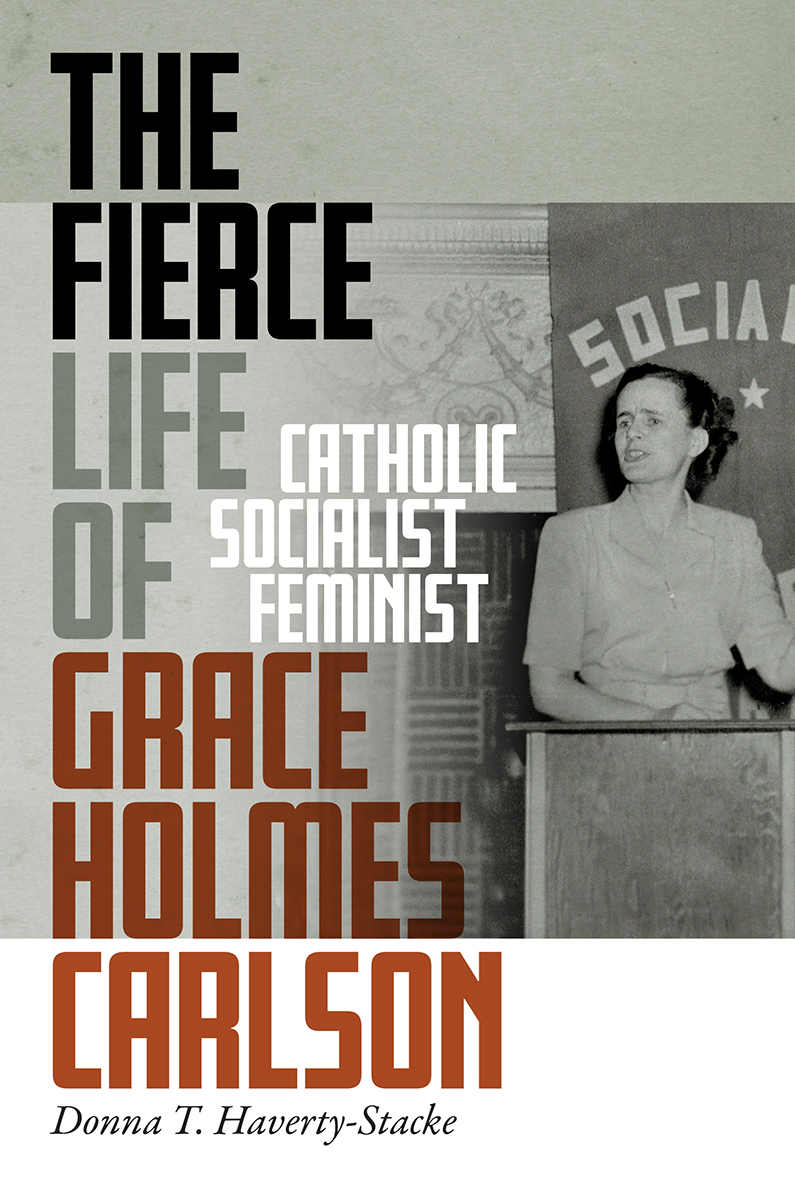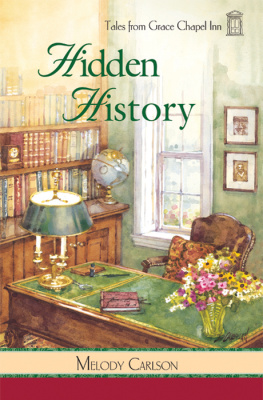Donna T. Haverty-Stacke - The Fierce Life of Grace Holmes Carlson
Here you can read online Donna T. Haverty-Stacke - The Fierce Life of Grace Holmes Carlson full text of the book (entire story) in english for free. Download pdf and epub, get meaning, cover and reviews about this ebook. publisher: NYU Press, genre: Politics. Description of the work, (preface) as well as reviews are available. Best literature library LitArk.com created for fans of good reading and offers a wide selection of genres:
Romance novel
Science fiction
Adventure
Detective
Science
History
Home and family
Prose
Art
Politics
Computer
Non-fiction
Religion
Business
Children
Humor
Choose a favorite category and find really read worthwhile books. Enjoy immersion in the world of imagination, feel the emotions of the characters or learn something new for yourself, make an fascinating discovery.

- Book:The Fierce Life of Grace Holmes Carlson
- Author:
- Publisher:NYU Press
- Genre:
- Rating:3 / 5
- Favourites:Add to favourites
- Your mark:
- 60
- 1
- 2
- 3
- 4
- 5
The Fierce Life of Grace Holmes Carlson: summary, description and annotation
We offer to read an annotation, description, summary or preface (depends on what the author of the book "The Fierce Life of Grace Holmes Carlson" wrote himself). If you haven't found the necessary information about the book — write in the comments, we will try to find it.
The Fierce Life of Grace Holmes Carlson — read online for free the complete book (whole text) full work
Below is the text of the book, divided by pages. System saving the place of the last page read, allows you to conveniently read the book "The Fierce Life of Grace Holmes Carlson" online for free, without having to search again every time where you left off. Put a bookmark, and you can go to the page where you finished reading at any time.
Font size:
Interval:
Bookmark:

Donna T. Haverty-Stacke

NEW YORK UNIVERSITY PRESS
New York
NEW YORK UNIVERSITY PRESS
New York
www.nyupress.org
2021 by New York University
All rights reserved
References to Internet websites (URLs) were accurate at the time of writing. Neither the author nor New York University Press is responsible for URLs that may have expired or changed since the manuscript was prepared.
Library of Congress Cataloging-in-Publication Data
Names: Haverty-Stacke, Donna T., author.
Title: The fierce life of Grace Holmes Carlson : Catholic, socialist, feminist / Donna T. Haverty-Stacke.
Description: New York : New York University Press, [2020] | Includes bibliographical references and index.
Identifiers: LCCN 2020015049 (print) | LCCN 2020015050 (ebook) | ISBN 9781479802180 (cloth) | ISBN 9781479892006 (ebook) | ISBN 9781479804535 (ebook)
Subjects: LCSH : Carlson, Grace Holmes, 19061992. | Women socialistsUnited StatesBiography. | FeministsUnited StatesBiography. | CatholicsUnited StatesBiography.
Classification: LCC HX84.C37 H38 2020 (print) | LCC HX84.C37 (ebook) | DDC 324.273/7 [ B ] dc23
LC record available at https://lccn.loc.gov/2020015049
LC ebook record available at https://lccn.loc.gov/2020015050
New York University Press books are printed on acid-free paper, and their binding materials are chosen for strength and durability. We strive to use environmentally responsible suppliers and materials to the greatest extent possible in publishing our books.
Manufactured in the United States of America
10 9 8 7 6 5 4 3 2 1
Also available as an ebook
For my Josephine, a brave girl with the heart of a fierce woman.
Illustrations appear after Chapter 3
On November 25, 1992, Sister Anne Joachim Moore, of the Congregation of the Sisters of St. Joseph (CSJ), delivered a eulogy at Saint Marys Junior College (SMJC) in Minneapolis for her dear friend and colleague, Grace Holmes Carlson. Sister AJ had worked with Grace since the early 1960s when the two wrote the founding plan for SMJC. Grace, who had been raised a Catholic in St. Paul, left the Church during the late 1930s and joined the Socialist Workers Party (SWP), to which she then devoted her life for the next fourteen years. She was the only female defendant among the eighteen Trotskyists convicted under the Smith Act on the eve of Americas entry into World War II in 1941. In 1948 she ran for vice president of the United States under the Socialist Workers Party banner, but, in 1952, she left the SWP and returned both to her professional life as an educational psychologist and to the Catholic Church. During this second phase of her life, she dedicated herself to the educational mission of SMJC. She worked closely with Sister AJ to educate young women in the technical skills of nursing and in a liberal arts curriculum, both couched in a Catholic cosmology in which ones efforts were focused on service to God and to others.
In her eulogy Sister AJ remembered the many facets of Graces long and productive life. She also captured much of Graces personality. Recalling Graces struggle to recover her voting rights after the 1941 Smith Act conviction, Sister AJ noted that it was not until the early 1960s that she had them restored. Grace enjoyed describing [to her friends] the reaction on the young bureaucrats face when, in completing the forms he asked her why/how she had lost these rights, to which her response was, Of course, by attempting to overthrow the government by force and violence. Sister AJ explained that I think she loved that little episode connecting back to her exciting and thrilling days as a [n]ational figure, one to be reckoned with by the government. She was a fierce woman with a light, good-humored touch.
Even as she earned a PhD in psychology at the University of Minnesota in 1933 and built a professional career for herself by 1940, Grace continued to see herself as a member of and defender of the working class. Partly this identification came from her Irish and German working-class rootsher father was a boilermaker on the Great Northern Railway, and she grew up in St. Pauls Rice Street districtbut it also was a result of her conversion to Marxism during the 1930s. These experiences shaped not only her life choices but also her perception of her lifes trajectory. Over the course of her life, even as she rose into the middle class in terms of occupation and income, Grace continued to identify with workers and their concerns. Graces story thus illuminates both how working-class subjects come to be and how class operates in the spaces between occupation, politics, life experience, social networks, and culture.
Graces life was also one marked by lived Catholicism in which that faith traditionand the women and men of the formal, organized religious institutionshaped her commitment to social justice. Grace was raised in the Catholic faith, educated in parochial school by the Sisters of St. Joseph, and she later returned to the Church and to the Josephites, who found work for her at what became St. Marys Junior College after she left the SWP in 1952. Her story contributes to recent historical scholarship on the importance of understanding the role of faith in workers lives. It speaks to how religion shapes working-class political consciousness and can sustain different types of political action.
Graces years in the SWP also provide an atypical story of a woman in the role of a party organizera woman among many men within a movement that prioritized class-based concerns over gender equalitywho nonetheless rose in the ranks of the party and translated its message to address womens struggles. Her career, and the lives of her female comrades at the party branch level that become visible in her extensive correspondence with them, illuminate both the possibilities and the limitations for women in the period between the Lyrical Left of the 1920s and the New Left of the 1960s. Graces life was thus also part of the less familiar history of an alternative struggle for equality during the 1930s, 1940s, and 1950s among working-class women more generally and revolutionary Marxist women more specifically.
Developments over the past few decades in the fields of both biography and working-class and radical history have opened the way for such inquiries. Since the late 1980s and early 1990s in particular, feminist theory has reinvigorated the historical study of individual lives, introducing, as Susan Ware has argued, a different type of person as worthy of biographical treatment and placing gender at the center of the interpretive and narrative strategy, with equal attention paid to private and public lives.
The appreciation of private lives, however, does not have to come at the expense of attention to structural forces but can come in recognition of the complex relationship between the two. As Nick Salvatore has described this kind of biographical approach, The value, then, of understanding a particular life in its broad social context is precisely this: it examines the process of historical change through an individual who, like other humans, grapples simultaneously with complex forces both public and private. He argues that the test, then, for biography is not whether the subject is representative, whatever that may mean, but rather what it is we might learn from a study of a specific life. This biography examines the links between the many facets of Grace Holmes Carlsons private life and her extraordinary public career. These connections illuminate how working-class subjects have identified themselves in the past, how struggles for womens equality were defined and related to other social and political movements between the 1930s and the 1950s, and how some individuals who held the Catholic faith found theological and practical support for their commitments both to social justice and to womens autonomy even before the reforms of the Second Vatican Council (19621965).
Next pageFont size:
Interval:
Bookmark:
Similar books «The Fierce Life of Grace Holmes Carlson»
Look at similar books to The Fierce Life of Grace Holmes Carlson. We have selected literature similar in name and meaning in the hope of providing readers with more options to find new, interesting, not yet read works.
Discussion, reviews of the book The Fierce Life of Grace Holmes Carlson and just readers' own opinions. Leave your comments, write what you think about the work, its meaning or the main characters. Specify what exactly you liked and what you didn't like, and why you think so.




